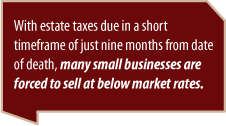According to statistical data there are over 925,000 small businesses in Pennsylvania. Many of these businesses have few, if any employees. If the business owner dies without any type of preparation or planning, who is left to pick up the pieces? While many small business owners are focused on growing their business, they also need to take time to plan for the unexpected and communicate those plans to business partners and family members.
Minimizing estate taxes
Estate planning for the small business owner can take a variety of paths depending on the type of entity structure. However, the one common thread in estate planning is working to minimize the amount of taxes that are owed upon a person’s death. In Pennsylvania there are two types of taxes which may be due when a person dies:
- Pennsylvania Inheritance Tax is due for all assets that are in the decedent’s name, or in which the decedent had an interest. This tax rate is based upon to whom the assets are going. For example, assets which pass to a spouse or to a charity are not subject to tax, however, assets passing to children are subject to a 4.5% PA inheritance tax. If the assets are going to a sibling, the tax rate is 12%—all others are taxed at a rate of 15%.
- Federal Estate Tax may also be due on all assets in excess of the federal estate tax exemption amount. The current federal exemption amount for 2013 is $5,250,000. Any assets in excess of this amount are taxed at a rate starting at 40%. While there is no tax due between husband and wife, this tax can be incurred when assets pass on to other beneficiaries.
 Most small business assets are not liquid, and therefore, paying inheritance or estate taxes sometimes requires selling the business to allow for payment of these taxes. Pennsylvania inheritance tax and federal estate taxes are generally due within nine months of the date of death. This short timeframe for payment of taxes can be nearly impossible for many small businesses and often result in sale of a business at below market rates.
Most small business assets are not liquid, and therefore, paying inheritance or estate taxes sometimes requires selling the business to allow for payment of these taxes. Pennsylvania inheritance tax and federal estate taxes are generally due within nine months of the date of death. This short timeframe for payment of taxes can be nearly impossible for many small businesses and often result in sale of a business at below market rates.
How do you address these concerns to allow for a smooth transition in the event of a death? While there are a variety of options available for businesses, the first step is to take some time to think about succession planning and exit strategies.
Succession planning & exit strategies
If you are a sole proprietor, your business is you, and not separate from your personal assets. You need to make sure that you have a clear plan of action for when you are gone. How will business debts be paid from your personal assets; who will be appointed to handle your affairs; have you identified a successor; will the business need to be sold? In addition, how will your business continue to operate in the event of any incapacity during your lifetime? Having a general durable power of attorney in place will ensure that someone you trust will have the authority to continue to operate your business in the event you are not able to during your lifetime.
 If you are in business with other individuals, is there a buy-sell agreement which establishes a plan for the business in the event that one of the owners dies or becomes incapacitated? A buy-sell agreement typically provides a way of setting a sale price for an individual’s share of the business. It also sets forth the process by which a persons’ interest in the business can be transferred. In the event that business assets are not liquid, a life insurance policy may be utilized to fund the buyout of a deceased owner’s interest in the business. Each partner takes out a life insurance policy which names the other owner as a beneficiary. This approach gives the surviving owners tax-free proceeds with which to purchase the deceased’s portion of the business from his or her estate.
If you are in business with other individuals, is there a buy-sell agreement which establishes a plan for the business in the event that one of the owners dies or becomes incapacitated? A buy-sell agreement typically provides a way of setting a sale price for an individual’s share of the business. It also sets forth the process by which a persons’ interest in the business can be transferred. In the event that business assets are not liquid, a life insurance policy may be utilized to fund the buyout of a deceased owner’s interest in the business. Each partner takes out a life insurance policy which names the other owner as a beneficiary. This approach gives the surviving owners tax-free proceeds with which to purchase the deceased’s portion of the business from his or her estate.
In a family-run business, you may have some family members who are involved in the business and others who are not. How do you pass on the business in a way that is fair to all your beneficiaries? Proper planning will allow for a smoother transition when there is clear communication and planning around the issues of succession.
A family limited partnership is a type of business entity that is commonly used for real estate ownership. This structure allows parents or business partners the power to retain management and control over the business assets while permitting gifting of these assets to their children. Because these assets are usually real estate, the general partners are able to discount their value, permitting them to transfer a higher value each year and allow the business to be transferred to family over time. For 2013, the annual gift exclusion amount is $13,000.00.
Another option is an irrevocable life insurance trust (ILIT). Life insurance proceeds are included in a decedent’s estate for federal estate tax purposes if the decedent was the owner of the policy. However, an ILIT is one way to remove this asset from your estate. The owner of the policy becomes the ILIT which is a separate entity for tax purposes and the proceeds can then be excluded from the decedent’s estate.
One key to effective estate planning is to coordinate this planning between your business, financial, and legal advisors. By bringing together your key advisors, you can make sure that whatever planning you put into place takes into account the various aspects of your business to create the best solution for you. Whatever your situation, it is important to plan ahead and make sure that your plan is communicated to your family and business partners.
[author] [author_image timthumb=’on’]https://sensenigcapital.com/wp-content/uploads/2013/11/charlotte-thumb2.png[/author_image] [author_info]Charlotte A. Hunsberger is a Partner at Bricker, Landis, Hunsberger, & Gingrich, LLP. Charlotte received her B.A. from Eastern Mennonite University in 1991 and her J.D. from Temple University School of Law in 1998. Her practice focuses on real estate, business representation, employment law, non-profit, and estate planning and administration. Charlotte serves on various Boards of Directors including Harleysville Savings Bank, and Eastern Mennonite University. For more information on her firm click here.[/author_info] [/author]


